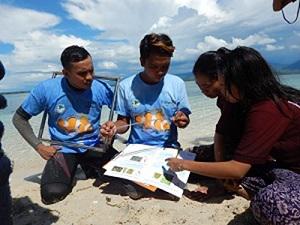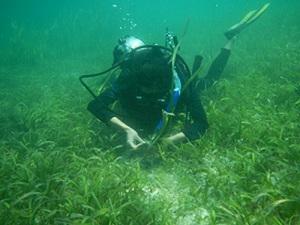Eni Hidayati
Other projects
6 Jul 2010
Environmental Journalism Training: A Means to Raise Youth Awareness about Coral Reefs Conservation in Sumbawa Island
20 May 2013
Youth-Based Coral Nursery for Future Rehabilitation in Sumbawa Island, Indonesia
The establishment of youth-based environmental education centre in the Kramat, Bedil, Temudong (KABETE) marine conservation areas, Labuhan Bajo Village, Sumbawa Island, was aimed at increasing youths’ role in the management and conservation of the areas. The purpose of this project is to raise local youth capacity to manage environmental education centre.

Seagrass identification.
After several consultations and meetings with various stakeholders (relevant governmental agencies and local community) to build a consensus to designate areas for marine and coastal environment education, the KABETE Education Centre was established on April 2015. Their written commitment was signed on April 2015 during a community meeting. The government of Labuhan Bajo Village has also issued a Decree about the local youth group managing the education centre on April 2015. The vision is to slow down the rate of coral reefs, mangroves, and seagrass ecosystems destruction through education programmes. The overall purpose is to secure area which is relatively in good condition to connect with and learn about the coral reefs, mangroves, and seagrass ecosystems and to empower the local youth to educate others.

Collecting seagrass specimen for herbarium.
This project will improve the skills of the local youth who manage the Environmental Education Centre. The focus of this project will be on three skills: monitoring and data management, waste management, and proposal writing.
The output of the monitoring and data management training will be:
(1) a user-friendly monitoring instrument for coral reef, mangrove, and sea grass,
(2) a participatory monitoring mechanism involving the local fishers,
(3) a database platform for the biodiversity of the Kramat, Bedil, and Temudong (KABETE) islands.
The output of the waste management training will be:
(1) a regular clean up schedule to increase public awareness,
(2) organic waste and nonorganic waste management will be done as part of the Education Center programme. The output of the proposal writing will be at least three proposals are produced by the local youth and submitted to the relevant stakeholders within one year.
This project will also improve the skills of the local youth to produce locally relevant education materials (i.e. module, film, and herbarium) for kids and youths. The output will be module, film, and herbarium which they will use to educate more people through the education center. This project will also contribute to the development of edu-tourism package as a future exit strategy for the sustainability of the education center.